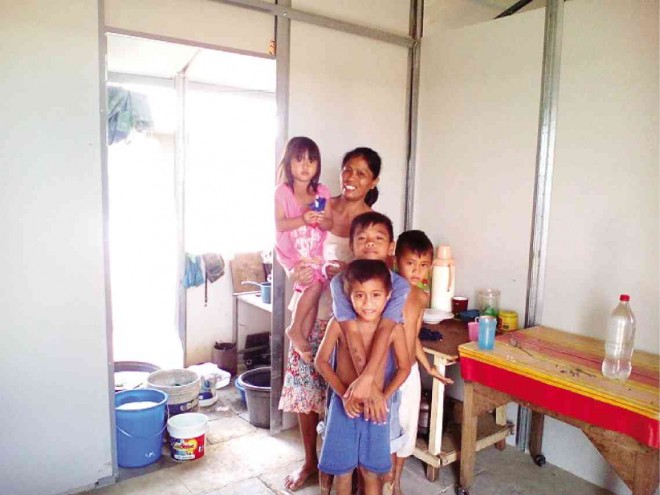Quiet work of charity group delivers results

Jonalyn Medalla and her children are happy in their new home in the resettlement site for survivors of Supertyphoon “Yolanda” donated by Tzu Chi Foundation in Barangay Lilo-an, about 12 kilometers from the city proper of Ormoc in Leyte province. JOEY A. GABIETA
Jonalyn Medalla is feeling giddy like a little girl. “We have now a new home,” said the 40-year-old mother of five children, smiling.
The Medallas are among the 725 families who now live in a resettlement site donated by Tzu Chi Foundation in Barangay Lilo-an, 12 kilometers from the city proper of Ormoc in Leyte province. They were among those rendered homeless when Supertyphoon “Yolanda” (international name: Haiyan) hit Ormoc and the rest of Leyte on Nov. 8, 2013.
Yolanda has been considered the world’s strongest typhoon to hit land.
Known as “Tzu Chi Great Love City,” the resettlement project sits on a 50-hectare lot donated by Ormoc Mayor Eduard Codilla to the Buddhist humanitarian group, which was among the first groups to provide help when Leyte, particularly Tacloban City, was devastated by Yolanda two years ago.
The displaced families come from Barangays Tambulilid, Cogon, Linao, Punta, Naungan, Macabung, Concepcion, Batuan and Bantigue. They had earlier stayed in bunkhouses in Barangays Concepcion and Can-ontog, all in the city center.
“We are happy that we now have a house that we can call our home,” Medalla said. She and her family occupy a 27-square-meter prefabricated house.
The bigger units are given to families with five children and more. Those with four children or fewer are assigned to a house with a floor area of 21 square meters.
Residents helped build the houses under a cash-for-work program. Construction at the resettlement site started on Sept. 27, 2014.
Each dwelling has steel frames, three screened windows, sliding doors, an open panel for ventilation, a toilet, kitchen, bedrooms and brick flooring.
At least 725 families are now living in the new community. Construction of other housing units is still ongoing, with at least 2,000 houses expected to be put up by 2017.
The first batch of beneficiaries, composed of 160 families, transferred to the relocation site on March 28. The second batch of 565 families moved in on Nov. 7, the eve of the second anniversary of Yolanda, while the third batch—300 families—will transfer next month.
At present, more than 400 families still live in the bunkhouses and are waiting to be resettled permanently at the Tzu Chi village.
Living in the resettlement site is more comfortable than in the bunkhouse, Medalla said. She and her family had been in their temporary shelter for eight months.
“We now have our privacy on top of the fact that this (house) is sturdier compare to the bunkhouse. My children can now sleep soundly even during heavy rain unlike (when we were in) the bunkhouse,” she said. Her husband, Jose, is a carpenter.
Another beneficiary, Mary Ann Dulag, 48, who has two children, agreed. “This is far better than living in a bunkhouse and even in our own house in Cogon. There, we had a house but we didn’t own the lot unlike here. Now we can say we own both the house and lot,” she said.
Dulag’s husband, Joseph, 41, drives a passenger jeepney in Cebu and sends them at least P1,500 a month from his earnings.
Despite the improved living conditions in the new community, the families lament the lack of supply of drinking water and electricity. For drinking water, they have to buy gallons of mineral water. They also depend on solar-powered lamps donated by Tzu Chi.
“I hope these concerns will be addressed. But we are really thankful to Tzu Chi Foundation (for giving us new houses),” Dulag said.
“We are aware of their desire to have steady supply of water and electricity,” said Jelly Beltran, a staff member of the foundation.
Water pipes are now being installed while street lights have already been put up inside the village, she said.
Imelda Dadulla, a social worker of the City Social Work and Development (CSWD), acknowledged the help provided by Tzu Chi Foundation to the survivors. “We cannot do it alone. They (Tzu Chi volunteers) are really a big help to us and to the people of Ormoc,” she said.
Ma. Victoria Huerta, CSWD head of the camp management team in the village, said providing homes to the families was not the only concern of Tzu Chi Foundation. “They (beneficiaries) are also being taught how to live peacefully,” she said.
But Huerta said they must follow rules imposed by the Buddhist group. These include curfew hours for children and adults. Children should be in their homes by 6 p.m. and adults, before midnight.
Drinking of liquor and using illegal drugs are strictly prohibited. Eating organic food, especially vegetables, is also encouraged.
“So far, it’s peaceful here and all are following the rules,” Huerta said.














